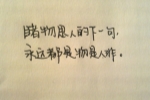
自考学位英语二作文万能句子【一】
1. Nancy is too young to dress herself.
Nancy is not _____ _____ to dress herself.
2. My watch doesn't work well.
There is ____ _____ _______ my watch.
3. Jane doesn't go to work by bus any longer.
Jane ____ _____ _____ to work by bus.
4. It took Mary two weeks to prepare for the exam.
Mary _____two weeks____ ______ for the exam.
5. It seems that they have known each other.
They seem to _____ _____ each other.
6. "My grandpa doesn't like coffee or coke" said Bob
Bob said that _____grandpa liked _____coffee _____coke.
7. Cao Fei joined the League three years ago.
Cao Fei _____ ____ _____ the League for three years.
8. I prefer walking there to going by bus.
I prefer to walk there ____ _____ going by bus.
9. -Thank you very much. -You're welcome.
- ____ a lot. -Not at____ .
10. Kitty does well in English.
Kitty ____ ____ ____ English.
11. They realized Hainan was a beautiful place after they reached there.
They____ realize Hainan was a beautiful place_____ they reached there.
12. We will have to finish the work hardly if you don't help us. We can't finish the work _____ _____ ______
13. My dictionary isn't so thick as yours.
My dictionary is _____ than yours.
14. Could you tell me where the East Street Hospital is? Excuse me, ____ is the _____ to the East Street Hospital?
15. The book is exciting to read.
It is ____ _____ read the book.
16. Jack's mother asked him, "Have you packed your things?" Jack's mother asked him ____ he ____ packed his things.
17. She likes singing better than dancing. She ____ singing ____ dancing.
18. Remember to ring me up as soon as you get to Nanjing Make ____ to give me a ring as soon as you _____ Nanjing.
19. They couldn't catch the train because of the heavy traffic. The heital?
15. The book is exciting to read.
It is ____ _____ read the book.
16. Jack's mother asked him, "Have you packed your things?" Jack's mother asked him ____ he ____ packed his things.
17. She likes singing better than dancing. She ____ singing ____ dancing.
18. Remember to ring me up as soon as you get to Nanjing Make ____ to give me a ring as soon as you _____ Nanjing.
19. They couldn't catch the train because of the heavy traffic. The heavy traffic _____ them from _____ the train.
20. My brother has been away from home for two days.
My brother _____ home two days _____ .
21. Li Lei decided to move to Canada when he was thirty.
Li Lei made a _____ to move to Canada at the _____ of thirty.
22. Jim was too careless to pass the exam last term.
Jim was not_____ _____ to pass the exam last term.
23. If you don't hurry up, you can't catch the train.
Hurry up, _____ you may _____ the train.
24. Yang Li wei said to us, "I'm going to visit your school tomorrow. " We were all pleased.
We were all pleased when we heard Yang Li wei_____ visit_____ school the next day.
25. This is the most interesting film I have ever seen. I have ____seen _____ an interesting film before.
26. I was late for school because of the traffic accident. The traffic accident _____ me _____ getting to school on time.
自考学位英语二作文万能句子【二】
(一例句:叶子上的虫还用治? 叶子上的虫子不用治。
1、 有几个虫子怕什么? 2、学习上遇到困难怕什么?
_________________________ _________________________
(二)例:李小青是我们班的劳动委员。 我们班的劳动委员是李小青。
1.他是王宁的哥哥。 。
2.树底下的那个人是新当选的干部。 。
3.那片绿绿的草地是市政府出资修建的。 。
4.这个闹钟是我的舅舅在生日那天送给我的。 。
5.天空是白云的家。 。
6.小明是育华小学五年级一班的班长。 。
(三)例:我把茶杯洗干净了。 茶杯被我洗干净了。
1.我把礼物送给好朋友了。
2.红旗被辅导员收起来了。
3.那一封沉甸甸的信被他精心地保存着。
4.二年级的老师已经把复习资料准备好了。
5.他把崭新的语文书整坏了。
6.昨天,小明把老师布置的作业完成了。
(四)改病句:
1.同学们脸上洋溢着愉快的心情。
2.中国名胜古迹很多,长城是唯一的.一处。
3.一辆日本朋友乘坐的汽车去故宫参观。
(五)组句子(把下面的词排列成通顺的句子写下来,再加上标点):
1 王红 少先队员 和 刘明 是
2 一起 你 和 打球 我 行吗
3、每天 我们 身体 锻炼 坚持 都
4、 天井 你们 吗 看过 的 天井湖
5、花瓶 谁 这只 是 打碎 的 ______________________________________
6.准备活动 领奖品 冲刺 起跑 ___________________________________________
7.菊花 迎春花 腊梅花 荷花 ______________________________________________
8.浇水 播种 买种 翻地 ______________________________________________
自考学位英语二作文万能句子【三】
It ______ ______ ______ the train will be late.
答案:is likely that
2. It is likely that the typhoon will sweep across the island.
The typhoon ______ ______ ______ ______ across the island.
答案:is likely to sweep
3. I think trying to stop the couple quarrelling will be of no use.
I think it's ______ ______ ______ to stop the couple quarrelling.
答案:no use trying
4. Every time I was in trouble, he had no hesitation in helping me.
Every time I was in trouble, he came to help me ______ ______.
答案:without hesitation
5. He never hesitates to help if I have any problem.
He always helps me ______ ______ if I have any problem.
答案:without hesitation
6. I crossed the street so as not to meet him, but he saw me and came running towards me.
I crossed the street to ______ ______ him, but he saw me and came running towards me.
答案:avoid seeing
7. It seems that the students in that class have all passed the qualified exam.
All of the students in that class ______ ______ ______ ______ the qualified exam.
答案:seem to have passed
8. It seems that the boys of the class are playing football on the playground.
The boys of the class ______ ______ ______ ______ football on the playground.
答案:seem to be playing
自考学位英语二作文万能句子【四】
一. .................................................................................................................................................. 1
二. .................................................................................................................................................. 1
三. .................................................................................................................................................. 2
四. .................................................................................................................................................. 3
五. .................................................................................................................................................. 8
一简述
1. 当过去分词在句末时,不管有无逗号,都是就近修饰名词;
2.现在分词在句末时,无逗号是就近修饰的名词的定语;
3.当现在分词在句尾且前有逗号时,修饰邻近句子的\'主语,做主语的伴随状语或做句子的伴随结果.因此不能用句尾现在分词修饰前面句尾的名词. 所以OG127说C选项:"the phrasehaving been assigned...is uncertain in reference,making the sentence unclear."-->就是说这个现在分词本来是应该修饰前面的employee的,却变成了修饰主语governments了. (另外在GMAT里,having been done的用法错误,应直接用done
避免上述错误的方法:所修饰的名词在句尾用定语从句修饰--OG127正确选项B (而不用加逗号的现在分词修饰.其实分词是定语从句的省略形式,在句中无逗号分词(注意是无逗号的,有逗号的在句中有歧义就比定语从句简洁还有 OG120也是同样道理:修饰句尾名词,正确选项A用定语从句.E选项的句尾现在分词错误.
4.当现在/过去分词在句中且前没有逗号,修饰前面紧邻名词;
5.当现在/过去分词在句中且前后都有逗号,有歧义:1修饰前面紧邻的名词,2向后修饰后面句子的主语.
这种结构在GMAT肯定错,如果修饰某句主语,则避免将该分词置于以名词结尾的句后.避免方式:1用定语从句/介词短语明确修饰对象.2可将分词提到句首,所修饰主语及所在句子紧跟其后-->形成句首分词修饰句子主语.见OG179
6.在前面有多个名词如名词1+介词+名词2结构,而要用分词修饰名词1时,为避免歧义要重复名词1即用同位语结构:名词1+介词+名词2,名词1+分词.见OG208
二.
1、doing/done,SVO 注意分词的逻辑主语与S一致
2、介词/连词+doing/done,SVO 也要注意分词逻辑主语与S一致
3、S,doing/done,V 分词作定语修饰主语(前后一对逗号隔开,相当于定语从句)
注意:如果出现: “名词,doing,名词”,则会有分词前后的修饰歧义,如179DE,245E
4、SVO doing 分词作定语修饰主语,如 96AC,121C,146E,222A,234B,237E
5、SVO,doing
A、分词优先作状语
1)修饰主语(与分词在句首一样,注意逻辑主语),如 33B,39C,44B,120E,163D,256B
2)修饰主句动作,如 78BD,119B,154A,259A
B、其次作定语,但没有定语从句清晰,会有修饰歧义,如 253DE,(“,including”除外 249)
6、SVO done 分词作定语修饰O(同4)
7、SVO,done
A、分词作状语修饰S,如 大全558
B、分词作定语修饰O,如 127A(分词相当于形容词 253A)
some people base on sth是绝对错误的。但是有sb. base sth. on sth.的用法. 三.
1.SVO+doing,无逗号的情况下doing是针对宾语的动作,96AC(OG says : assuring针对主语有问题,121C,146E,222A(OG says: enabling很好的修饰了宾语,234B,237E -------以上证明了ets的偏好,svo+doing修饰主语是模糊的,修饰宾语是清晰的
2.SVO, doing有逗号,33B,39C(Og says:protecting很好的
解释了主语的行为,44B,120E(Og says:错误选项有可能混淆的指代主语而不是逻辑上正确的宾语,163D(Og says:sleeping正确的修饰了主语,256B --------以上证明了在Og中svo,doing的doing多指代主语
3.svo,doing有逗号,78BD(doing指代了前面整个句子的行为,119B(同前,154A(*,259A(同前------------以上证明了Og中svo,doing的doing多指代前面的整个句子
四.例子
产生participle phrases原点是为了to reduce wordiness by replacing longer adverbial or relative clauses,另外要强调的重要讯息不会写成participle phrases,因为分词修饰语属于次等地位(The
modifier is subordinate to the main clause。也就是说A….and B…(A与B一样重要,如果A…V..,B...Ving (就重要性而言A>B
简单一句:分词构句是主要句子的意义延伸。
目前我看到有几种句意:
1. 因果(★★★★★
2. 补述:解释某事(★★★、描述状态并列或伴随(★★、纯举例
participle
phrases如此具困扰性是因为可以改写的来源多
1.由adj. clauses (如who, which开头可改写成分词词组。考题中可分形容词子句限制性、非限制性改分词的考法。
2. 副词子句(有连接词开头的也可改分词词组,所以有因果关系或时间关系,单纯就时间关系看,可以有先后或同时,会有动作是伴随或是并列关系。
3.当三个以上的动词用and相连时,后面的部分也改写成分词(V, Ving... and Ving...。
我看过的说法中,觉得Manhatan GMAT备考网站,里面指导员所讲的分词概念不错,但是他的目的在卖书,所以讲的真的不多。
1.当分词构句放句首,修饰后面句子的主词。前几天看到有人发帖的整理,讲到分词在句首,表示此动作先于主要句子的动作,讲的真好。
2.当分词构句不放在句首时:
if
there's NO COMMA before a participle, then the participle creates an adjective phrase that modifies the noun immediately
preceding.
if
there's a COMMA before a participle, then the participle creates an adverb phrase that modifies the action of the preceding
clause.
PS:逗号的产生可能是插入语,遇到插入语可以跳过不看,不代表分词修饰这个插入语。
判断上抓前句的动词与主词,如果用中文想就是「此主体这个动作的行为导致或表示.....」(to modify the action of。而且不可以只有思考主词或动词。 如果遇到前句有数个动词,以找最近的动词为主,譬如V1 to V2,分词构句修饰V2
3.
participle (V-ing after the comma can not modify the subject of the preceding clause's
noun.
這個考「什么情况下不可以改成分词构句?」除了需要有对等连接词的句子,不可改分词构句,因为句意重要性会被改变外,
打逗号的Ving分词,无法修饰逗号之前的名词,所以非限制的形容词子句最好不要改分词Ving构句(有7個考題,但是Ved分词例外(有两个考题。

















